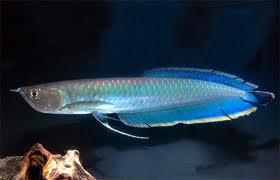
Common name: Blue Arowana, Blue Dragon Fish, Dragon Fish
Scientific name: Osteoglossum Ferreirai
Average Adult Fish Size: 48 inches / 120 cm
Place of Origin: Negro River basin (Brazil and Colombia) and the upper Essequibo River basin (Guyana) in South America
Typical Tank setup: A lot of swimming space is necessary. Decorate with rock work, bogwood/driftwood and sturdy plants such as Amazon Swords and Giant Vallisneria. An agitated Blue Arowana may uproot plants with poor root systems.
Recommended Minimum Aquarium Capacity: Juveniles can be kept in an aquarium as small as 40 gallon /160 litre, but adults will eventually need an aquarium of 600 gallon / 2400 litre or larger.
Compatibility: 6 or more juveniles can be kept together, but 10 or more is better. The same with adults, but this is a gamble as some adults do not tolerate others of their own kind well. Beside keeping them in schools they should be kept with peaceful to moderately aggressive fish that cannot be eaten and that will not harass the Arowana.
Temperature: 75 to 82 degrees F (24-28 C)
Water chemistry: pH 6.0 – 7.5
Feeding: Juveniles will readily eat small fish, tadpoles, live brine shrimp, live brown worms, small earthworms and other live foods, but should be trained to accept pellets, sticks, chunk of frozen foods, chopped and whole market shrimp, and other meaty foods. It is not only less expensive to feed a Blue Arowana prepared foods instead of feeder fish, but it is also healthier for it too.
Sexing: Unknown
Breeding: Blue Arowanas are mouthbrooders. Due to their large eventual size they are bred only in large ponds.
Additional Information: It is critical that the aquarium has a tight fitting and secured lid that is extremely strong. Arownas are avid jumpers and can easily knock a heavy glass lid onto the floor! Many an Arowana has been lost this way. They do not tolerate poor water quality, so excellent filtration along with frequent partial water changes of 25% or more is required to keep nitrates low.
Their tank should be placed in low traffic areas to keep the Arowana from getting frightened by sudden movements. They can be shy, and easily spooked. For example, when turning on the lights, it is wise to turn on the room lights first. Then after a few minutes, turn on the tank lights. Otherwise, your Blue Arowana might get spooked and injure itself.
It is wise to get them after their eggsack has been completely absorbed and are at least 4 – 8 inches/ 10 – 20cm in length when they are hardier and easier to handle. This will give you a better chance of success keeping them.
The Blue Arowana is particularly susceptible to droop eye – much more information about this can be found in the article we have written on the Arowana Droop Eye Syndrome .
The growth rate of a Blue Arowana is about two inches (5cm) a month during their first year, so be prepared to keep them in large and progressively larger aquariums.


Related Posts
Croaking Gourami – Trichopsis vittatus
Benthochromis Tricoti
Large-eyed Mouthbrooder – Callochromis Macrops